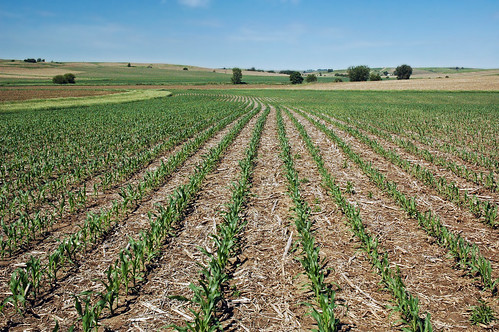
- Corn crops are an example of staple food crops in which biomedical agriculturists are able to incorporate nutrients for better health. (Photo credit: NRCS Soil Health)
Dr. Henry Thompson is growing his field of agriculture with biomedicine in mind. Thompson, a CSU professor with the group Crops for Health, is the mastermind behind an effort that aims to target chronic diseases like cancer, obesity, vascular diseases and diabetes. Globally these account for 60 percent of mortalities and according to Thompson, this is a problem.
“The world is not going to be able to afford the medical costs associated with treating chronic diseases,” Thompson said.
The principal aim of nutrition is identifying chemicals — nutrients — that our bodies cannot make but need, and incorporating them into our diet with foods. Biomedical Agriculture is able to combine nutritional knowledge with staple food crops — which are widely consumed and cheaply available — in order to improve diets worldwide.
“I’d rather discover varieties of staple food crops that have strong biomedical activity and build a 21st century diet on that,” Thompson said.
Thompson works at the cancer lab and described the screening process in preclinical trials which can see results in as little as six weeks. Thompson is looking for particular biomarkers that are associated with anti-cancer activity from diet.
Dr. Mark Brick, professor in soil and crop sciences, said the group has seen some surprising results in preclinical mouse trials by replacing a normal diet with one high in beans.
“We were able to reduce the incidence of mammary cancer by almost 50 percent,” Brick said. “We did it twice because we didn’t believe it the first time.”
The group is not sure about what exactly is reducing tumor size, and they do not think it is just one chemical. They base their research on epidemiologic studies done with pulse crops — certain varieties of beans.
“We know that there is a correlation between pulse crops and lower incidences of chronic diseases,” Brick said. “We don’t believe in a magic bullet theory. But we are seeing programmed cell death (in tumor cells).”
Thompson said he has encountered resistance to this idea from those in the genetically modified organism and supplement fields. Thompson hopes that biomedical agriculture will be a cheaper and healthier solution than GMOs and supplements. He said these fields are more short-sighted.
“That presumes that there is one characteristic that accounts for health,” Thompson said.
Genetically modified organisms can be used in agriculture in order to increase yields, but consumers are worried that they are unhealthy. Biomedical agriculture is different because it seeks to increase nutritional value in natural species by selective breeding, according to Brick.
Globally, food and health are huge issues. Dr. Barbara Wallner, who is in charge of education and outreach on the project, said that in order to tackle these problems, a new approach is needed.
“Agriculture is about food production, and for people, food is about health,” Wallner said.
Thompson predicts biomedical agriculture’s ability to reach dinner tables is not about dieting or medicine. It is about cuisine.
“We don’t use agriculture as an instrument of public health, and we should,” Thompson said.
Collegian Science Beat Reporter Remi Boudreau can be reached at news@collegian.com.





